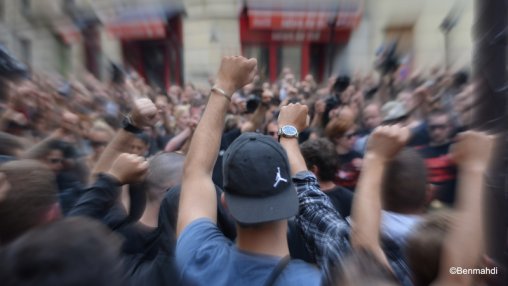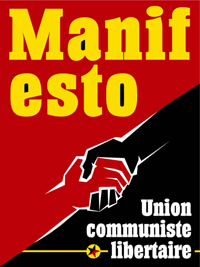 A Social and Popular Antifascism
A Social and Popular Antifascism
We generally favor social movements as instruments of change and action on reality. In terms of anti-fascism, they can have an essential role of containment and alternative.

Fascism cannot be reduced to the historical events embodied by Mussolini and Hitler. In forms adapted to our times, fascism continues to present itself as a modern political « solution ». Fascism is an ideology that claims to hybridize social and national discourse. It is linked to the formation of a « revolutionary right » that challenges the bourgeois democratic ideology, the rationalism of the Enlightenment. Fascism is therefore lived as « revolutionary », but serves the interests of the bourgeoisie by breaking up popular struggles, seen as a threat to « national unity ». It puts forward the nation presented as an entity that should be purified of internal enemies that are in its eyes minorities, foreigners, but also all that are considered as « subversive elements », inducing not only a racist, but also misogynistic and LGBTIphobic vision. It is finally a discourse assigning an identity to a territory.
Falsely anti-capitalist, this ideology defends the economic order, private ownership of the means of production and the search for profit. It opposes and arbitrarily separates industrial national capitalism, considered « authentic », to financial capitalism, then associated to Jews through antisemitic discourse. This discourse is in the bourgeoisie’s interests : national capitalism is thus legitimized, and the role of banks is readily accepted as long as they finance it.
Fascism wants to mobilize the masses
In practice, fascism as a government mode uses state terrorism combined with a strategy of terror carried out by armed gangs who serve the system with impunity. It seeks to mobilize the people on the streets in massive numbers to impose its views, to break through legislative and constitutional locks that may hinder it, and to muzzle its opponents—the labour movement, feminists, minorities and progressive or democratic organizations.
While it has an autonomous dynamic as a movement and as an ideology, fascism comes as a last resort in maintaining the privileges of the possessing minority. It’s for this reason that the majority of the bourgeoisie has always supported fascism against the labour movement in times of crisis, according to the French historical formula « Rather Hitler than the Popular Front ».
With this in mind, we affirm that the struggle against fascism is an absolute necessity. Far from being a secondary aspect of the class struggle, this struggle is a matter of survival for the dynamics of emancipation in times of crisis.
A strategy based on social movements
We generally favor social movements as instruments of change and action on reality. When it comes to antifascism, they can play an essential role of containment and put forward alternative perspectives.
A strike, a feminist mobilization, a struggle for housing, the defense of public services and public transportation are not necessarily antifascist. But, implicitly, by pursuing objectives of collective emancipation, they are an obstacle to the extreme right. First because they take space on social grounds, and target shareholders, beneficial owners, landlords and company bosses as members of an existing ruling class ; but also because they put forward other values : class solidarity instead of nationalist solidarity, mutual help rather than rancor and hatred, the desire for individual and collective emancipation rather than attachment to the traditional order, collective responsibility instead of delegating to leaders…
It’s fundamental to guarantee the anti-racist character of these struggles, their welcoming to each and every one, whatever their origin. Otherwise, according to their strategy fascists will try to take root in these social groups in order to orient them in a nationalist direction. However, while social struggles create a favorable political climate, they are not, in themselves, enough to stop fascism.
A specific fight against the far right
There is a specific antifascist fight to carry out : ideological, political, militant. It’s necessary to refuse the normalization of reactionary theses, unmask the deceivers, undo their arguments. We must be prepared to self-defend our spaces, our struggles, our neighborhoods, in the face of fascist aggression.
We are supporters of the broadest unity, but on clear bases, both humanistic and class-based. Social and popular antifascism must go beyond republican professions of faith on the one hand, and affinity and counter-cultural activism on the other.
We promote an antifascism that is not limited to opposing the « official » far-right, but that fights against all policies, whether they be restrictive, oppressive, serve the police, etc., that pave the way for it.







